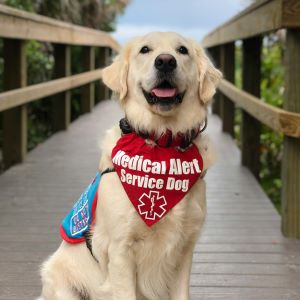It's a New Day in Public Health.
The Florida Department of Health works to protect, promote, and improve the health of all people in Florida through integrated state, county, and community efforts.
Sheltering with Service Animals
Bureau of Preparedness and Response
 Service animals provide essential support and independence for individuals with disabilities. Understanding shelter policies and preparing in advance ensures their safety during disasters.
Service animals provide essential support and independence for individuals with disabilities. Understanding shelter policies and preparing in advance ensures their safety during disasters.
Legal Protections
- Service animals are allowed in all public shelters under the ADA.
- No documentation required, vests and certification are not needed.
- Emotional support animals may not be permitted in shelters.
- Shelters must accommodate service animals, ensuring access and safety.
Read more about the ADA Requirements for Service Animals to be certain your service animal qualifies.
Preparing for Shelter Stay
- Essentials: Two weeks’ worth of food, bottled water, medications, ID tags, and vaccination records.
- Gear: Leash, harness, mobility assistance equipment, and waste disposal supplies.
- Comfort Items: Blankets, toys, and familiar belongings to reduce stress.
- Storage: Keep supplies in a waterproof bag for protection.
Responsibilities in a Shelter
- Always maintain control of your service animal.
- Ensure hygiene and care by cleaning up after them.
- Check space limitations - some shelters may lack designated relief areas.
- Communicate needs to shelter staff for accommodations.
Alternative Sheltering Options
If a shelter isn’t ideal, consider:
- Staying with family or friends in a pet-friendly home.
- Pet-friendly hotels.
- Veterinary clinics or boarding facilities offering temporary care.
Planning Ahead
A well-prepared evacuation plan ensures safety for both you and your service animal. Bring essential supplies, confirm shelter accessibility, and explore alternative options.
For more information, visit the Florida Division of Emergency Management or contact your local emergency management office.
Disclaimer: The links and content provided on this page are for informational purposes and your convenience. The Florida Department of Health (DOH) does not endorse, approve, or guarantee the products, services, or opinions offered on external websites. Furthermore, the DOH is not responsible for the accuracy, content, or availability of these external sites. For questions or concerns, please contact the external site directly.



Connect with DOH